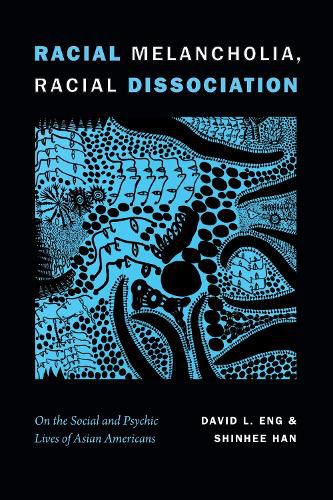Readings Newsletter
Become a Readings Member to make your shopping experience even easier.
Sign in or sign up for free!
You’re not far away from qualifying for FREE standard shipping within Australia
You’ve qualified for FREE standard shipping within Australia
The cart is loading…






In Racial Melancholia, Racial Dissociation critic David L. Eng and psychotherapist Shinhee Han draw on case histories from the mid-1990s to the present to explore the social and psychic predicaments of Asian American young adults from Generation X to Generation Y. Combining critical race theory with several strands of psychoanalytic thought, they develop the concepts of racial melancholia and racial dissociation to investigate changing processes of loss associated with immigration, displacement, diaspora, and assimilation. These case studies of first- and second-generation Asian Americans deal with a range of difficulties, from depression, suicide, and the politics of coming out to broader issues of the model minority stereotype, transnational adoption, parachute children, colorblind discourses in the United States, and the rise of Asia under globalization. Throughout, Eng and Han link psychoanalysis to larger structural and historical phenomena, illuminating how the study of psychic processes of individuals can inform investigations of race, sexuality, and immigration while creating a more sustained conversation about the social lives of Asian Americans and Asians in the diaspora.
$9.00 standard shipping within Australia
FREE standard shipping within Australia for orders over $100.00
Express & International shipping calculated at checkout
In Racial Melancholia, Racial Dissociation critic David L. Eng and psychotherapist Shinhee Han draw on case histories from the mid-1990s to the present to explore the social and psychic predicaments of Asian American young adults from Generation X to Generation Y. Combining critical race theory with several strands of psychoanalytic thought, they develop the concepts of racial melancholia and racial dissociation to investigate changing processes of loss associated with immigration, displacement, diaspora, and assimilation. These case studies of first- and second-generation Asian Americans deal with a range of difficulties, from depression, suicide, and the politics of coming out to broader issues of the model minority stereotype, transnational adoption, parachute children, colorblind discourses in the United States, and the rise of Asia under globalization. Throughout, Eng and Han link psychoanalysis to larger structural and historical phenomena, illuminating how the study of psychic processes of individuals can inform investigations of race, sexuality, and immigration while creating a more sustained conversation about the social lives of Asian Americans and Asians in the diaspora.